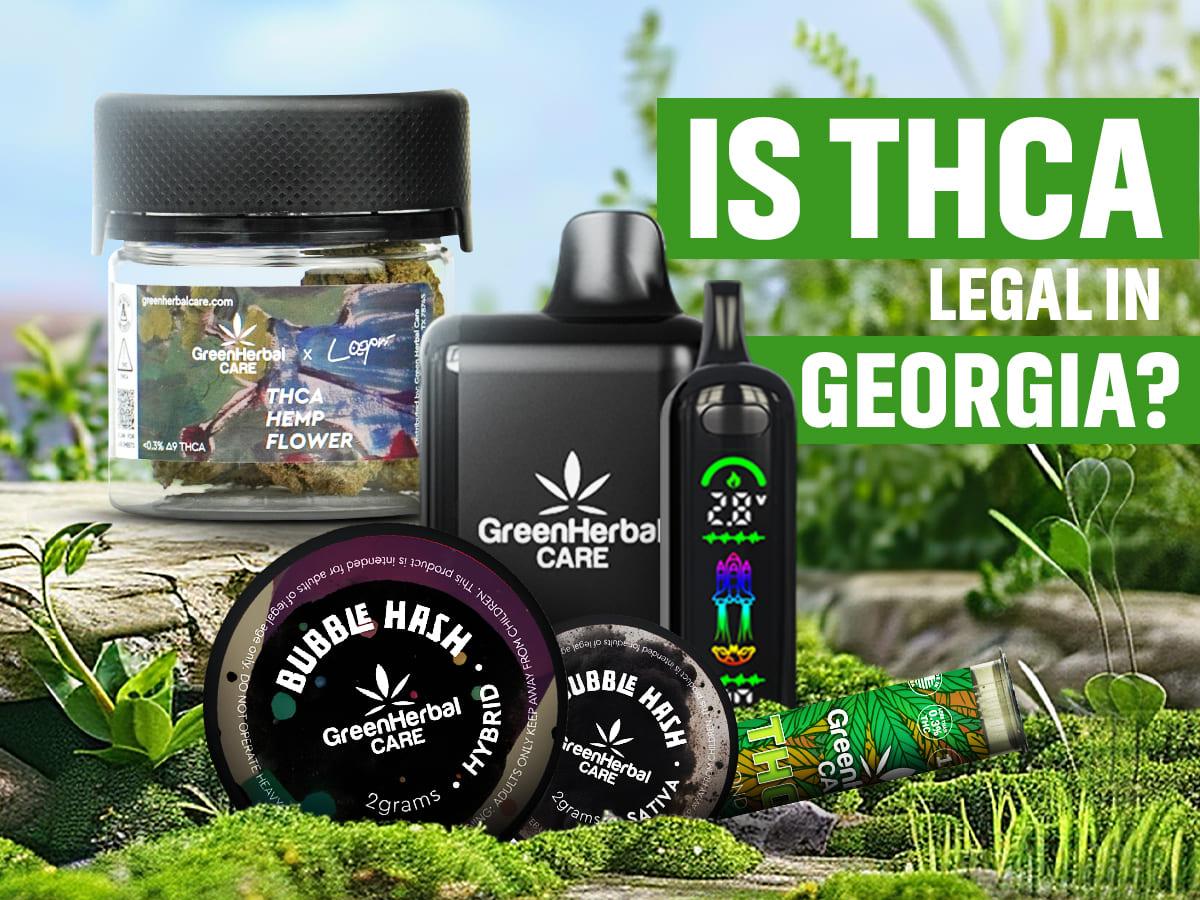You’ve likely heard whispers that THCA’s legal status in Georgia has changed—and they’re right. Things have shifted. Is THCA legal in Georgia? If you live in the Peach State or are considering ordering hemp products there, you’ll want to understand exactly where things stand. This guide walks you through Georgia’s hemp laws, the 2024 changes, what’s still allowed (if anything), and how a brand can operate legally in that environment.
What Is THCA—and Why It Was Once Legal
THCA (tetrahydrocannabinolic acid) is the raw, non-intoxicating precursor to THC. On its own, THCA doesn’t produce a “high.” But when heated (smoking, vaping, baking), THCA converts to Δ9-THC, which does. That capacity to convert is what made it a controversial loophole in many state laws. Under earlier frameworks, Georgia (like many states) followed the federal model: hemp products with Δ9-THC ≤ 0.3% dry weight were legal. Because THCA wasn’t always counted in that limit, some hemp flower, concentrates, or high-THCA products flew under the radar. But that changed.
The Georgia Hemp Farming Act & Age Limits
Around the same time, Georgia also implemented the Georgia Hemp Farming Act effective October 1, 2024. Key changes:
- Consumable hemp products (like edibles or ingestible products) now require a license for retail, wholesale, or manufacturing in Georgia.
- The law imposes age limits—selling consumable hemp products to under-21 is illegal.
- The state also placed oversight and regulatory requirements around testing, labeling, and packaging.
These rules restrict the operational flexibility of hemp businesses, especially those selling ingestible items, vapes, or other forms.
SB 494 & Georgia’s Rewriting of “Total THC”
In 2024, Georgia passed Senate Bill 494, which redefined how THC is measured. Under this law:
- THCA is now included with Δ9-THC when calculating total THC.
- The combined (Δ9 + THCA) must remain ≤ 0.3% on a lab test.
- Any product that fails total-THC compliance is considered illegal, regardless of whether it’s labeled “hemp.”
- The law effectively closed the “THCA loophole” that had allowed many high-THCA products to be sold.
- Raw flower and inhalable forms (vape devices, smokables) with high THCA often exceed that 0.3% total-THC threshold, making them non-compliant under Georgia law.
That shift means many THCA-rich products like THCA concentrates that were once sold legally in Georgia are now treated as illegal marijuana by the law.
Shop THCA Products
What THCA Products Are Now Illegal in Georgia
Is THCA legal in Georgia? Because of the new total-THC standard, many THCA products no longer clear the legal bar. Here’s how Georgia law views them now:
- Flower and Buds with High THCA: Most exceed 0.3% total THC when converted, so they’re illegal.
- Vapes and Cartridges Containing THCA: Also problematic, if the total THC (post-heat) is over the limit.
- Concentrates, Dabs, High-THCA Edibles: Likely disallowed unless they stay under 0.3% total THC.
- Products marketed with “high THCA” branding often don’t comply anymore.
It’s not just about whether THCA is present—it’s about whether the total converted THC stays within legal threshold. Exceeding it makes the item illegal. If you’re a resident of the Lone Star state, you’d probably want to know: Is THCA legal in Texas?
Can Any THCA Products Still Be Sold?
Yes, in theory—but very few:
- Low-THCA products that stay under 0.3% total THC (after conversion) are still allowed. Those are rare and typically mild.
- If a flower strain has extremely low THCA or is heavily diluted, it might comply—but that defeats the point for most users.
- Some non-heating applications (raw or topical use) may avoid conversion—but regulatory clarity is thin.
Still, the practical margins are so tight that most THCA products formerly sold in Georgia can’t be legally marketed now.
Enforcement & Risk
Georgia’s law gives law enforcement authority to test and confiscate non-compliant hemp products, including flower and concentrates. Retailers must comply or face legal risks. Consumers caught with illegal products may face prosecution depending on quantity and context.
Yes, there’s also public confusion—some users still believe THCA is permitted—but the law now explicitly combines THCA and Δ9 in enforcement.
How a Brand Can Operate Legally in Georgia
Given all this, how can a hemp or THCA brand still serve Georgia customers without breaking laws? Here’s how:
-
Strict Lab Testing & Compliance:
Only market products that pass total-THC tests (Δ9 + THCA ≤ 0.3%). Use reputable labs and show Certificates of Analysis (COAs).
-
Careful Product Selection:
Focus on low-THCA strains or alternatives like CBD, CBG, or mild hemp derivatives that stay well below the threshold.
-
Clear Labeling & Transparency:
Display COAs, terpene breakdowns, and total-THC compliance data so consumers know exactly what they’re buying.
-
Avoid Inhalable Products That Risk Decarboxylation:
Skip marketing high-THCA vapes or smokeable items if they’re likely to surpass legal limits after heating.
-
Follow Georgia Licensing Requirements:
For consumables, you’ll need the proper retail/wholesale licenses under the Hemp Farming Act.
-
Geo-Restrict Sales Where Needed:
Use shipping controls and filters to prevent sending products that might be illegal in certain ZIPs.
How Green Herbal Care Could Cater Safely in Georgia
Here’s how a brand like yours — which values education, compliance, and transparency — can serve Georgia customers responsibly:
-
Georgia-safe Lineup:
Only stock THCA flower or hemp flower that passes total-THC compliance (i.e. very low-THCA flower).
-
Georgia-specific Product Pages:
Tag or filter products that aren’t legal in Georgia; prevent checkouts for disallowed items.
-
Public COA Access:
Show detailed lab reports and clearly list Δ9 and THCA totals, so Georgia users see compliance.
-
Geo-aware Marketing:
Avoid marketing inhalable products or high-THCA strains in Georgia campaigns.
-
Educational Content:
Offer blog posts or pages explaining Georgia law (just like this one), helping users understand risk and compliance.
-
Local Partnerships:
Work with Georgia-licensed shops, state-compliant dispensaries (if any), or local hemp farms.
-
Regular Updates:
Commit to law tracking—when rules evolve, update your listings and notify Georgia customers.
By staying legal and transparent, the brand can maintain trust with Georgia users while avoiding legal exposure.
What Georgia Residents Should Watch Out For
If you live in Georgia or are considering a purchase, keep these points in mind:
- Don’t assume a product is legal just because it’s sold online.
- Always check the Certificate of Analysis (COA) to confirm total-THC compliance.
- Avoid buying high-THCA flower or vapes unless they are certifiably compliant.
- Retain receipts and lab reports in case legal questions arise.
- Keep up with state cannabis news and rule changes to stay informed.
The Verdict
So, is THCA legal in Georgia? The short answer: not in many forms. Thanks to Senate Bill 494, Georgia now treats THCA + Δ9 as a combined metric, meaning most high-THCA flower, vapes, and concentrates exceed the state’s 0.3% threshold and are now illegal under state law.
But for a quality brand that prioritizes transparency and compliance—providing only low-THCA, total-THC–compliant hemp products, with proper labeling, COAs, and shipping restrictions—serving Georgia customers is still possible. The key is staying informed, following licensing rules, and operating responsibly so your brand remains both trustworthy and lawful in a shifting regulatory environment.
Frequently Asked Questions
Can I travel with THCA products within Georgia?
It’s risky. Even if labeled as hemp, most THCA products exceed Georgia’s total-THC limit. Possession could be treated as marijuana, especially without lab proof showing ≤0.3% total THC.
Are online retailers allowed to ship THCA to Georgia?
Most reputable sellers restrict Georgia deliveries. Since Senate Bill 494 bans high-THCA goods, compliant stores avoid shipments there to protect consumers and themselves from state enforcement action.
What happens if I’m caught buying THCA flower online in Georgia?
If tested and found non-compliant, law enforcement may treat it as illegal cannabis. Penalties depend on the product type, quantity, and local enforcement discretion under Georgia law.
How does Georgia test THCA products for compliance?
Labs use chromatography to measure Δ9-THC and THCA. The state multiplies THCA by 0.877 to calculate total THC. Anything over 0.3% fails compliance immediately.
What hemp alternatives remain legal for Georgia consumers?
CBD, CBG, and compliant hemp oils under 0.3% total THC remain legal. Many residents choose these non-intoxicating cannabinoids for relaxation or wellness without violating Georgia’s stricter hemp rules.


